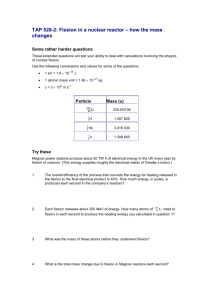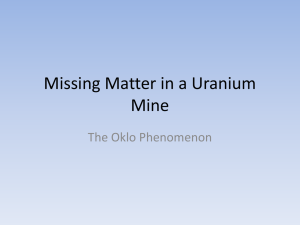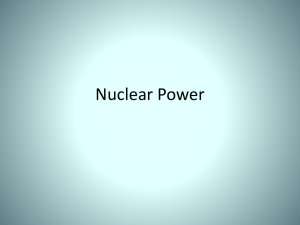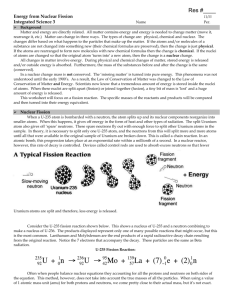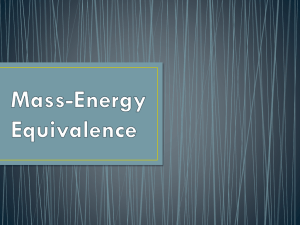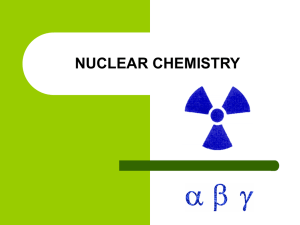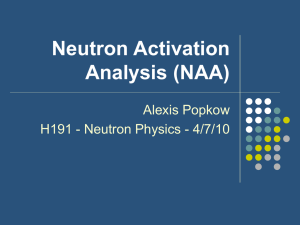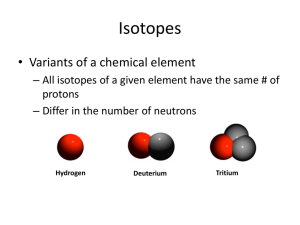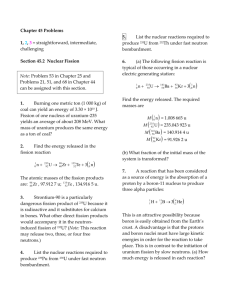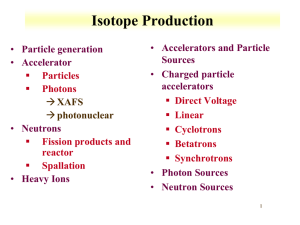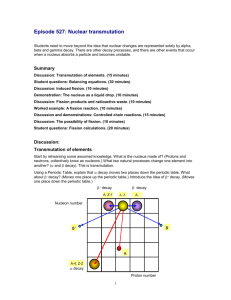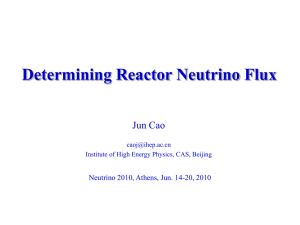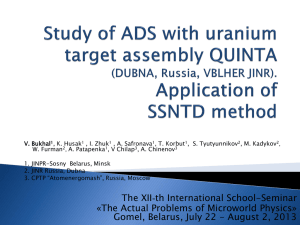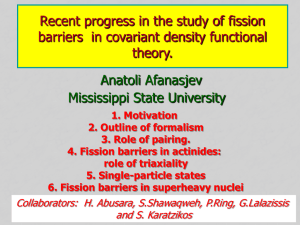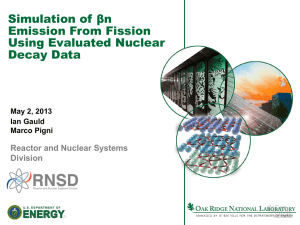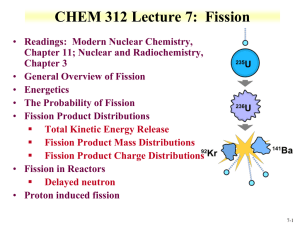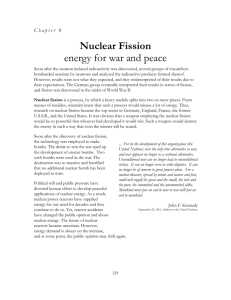The natural nuclear reactor at Oklo
advertisement
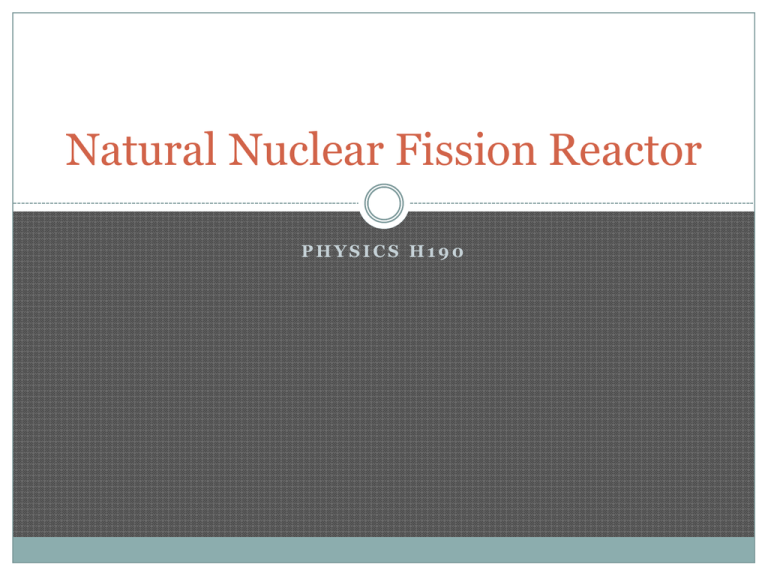
Natural Nuclear Fission Reactor PHYSICS H190 Fission Discovery and implementation of fission is arguably one of the more important and controversial scientific and technological discoveries in physics in the 20th century Surprisingly this may just been a naturally occurring phenomenon Precambrian Scientists would have found making a fission reactor remarkably simple A Small Discrepancy In 1972 at a French-Fuel processing plant, routine analysis of a standard sample of UF6 showed that it consisted of .7171 percent U-235 Natural Uranium contains .7202 percent U-235 The process of measurement, mass spectroscopy, is very accurate when applied to Uranium Hexafluoride www.euronuclear.org Possible Explanations Maybe it had been ocrwm.doe.gov contaminated with some depleted Uranium? Tests of U-236 available in reactor showed no signs of contamination Uranium was traced back to mine in Oklo where some samples hadU-235 at %.35 Since the isotopic composition of Uranium is though to be a constant of the solar system, the isotope shift must have occurred at the site The Byproducts of Nuclear Fission Recall how Nuclear Fission works. Absorption of Neutron by U-235 causes it to become unstable with %85 chance of it splitting into two and releasing multiple neutrons The fission products of nuclear fission are radioactive After years of decay the fission products consist of multiple isotopes of 30 different elements By Products of Nuclear Fission and Detainment at Oklo ocrwm.doe.gov Evidence: By Products Physicists came together to share their work on “the Oklo phenomenon” at a special 1975 conference held in Libreville, the capital of Gabon. The ore at the site at Oklo contained 15 of these elements The analysis of Neodymium help present an argument for there being fission reactions taking place Its chemical abundance gives the absolute number of fissions Provides an age of the reaction Note: Corrections are made based off Natural Neodynium present Nd-143, 145 readily absorb neutrons Evidence: Neodymium Byproduct Source: GA Cowan - Scientific American, 1976 Evidence for Natural Fission: Age By measuring Nd/U ratios the total number of neodymium atoms formed by fission can be obtained. Correct for Natural Nd-142 which does not occur in fission Number of Fissions that have occurred is X=τσN0 Where τ is integrated neutron flux (measured by Nd-143 Nd-144 Isotope ratios), σ is absorption cross section of U-235, N0 is average number exposed to flux Solve equation Nav=N0ave-λt for t t≈ 1.7-1.9 X 109 Four Conditions for Fission Uranium 235 concentrations http://electricalandelectronics.org must be high enough to sustain reactions with water moderator The size of the uranium deposit is large enough to ensure that the neutrons given off by one fissioning nucleus are absorbed by another, about two thirds of a meter. A Neutron “moderator,” to increase cross section. Lack of neutron absorbers (boron, lithium, etc.) A Tale of Two Half-Lives Todays Uranium has only .72% U-235 It is possible to sustain a reaction using this density but special non-natural conditions needed such as deuterium as a moderator. U-235 has half-life of about 700 Million years U-238 has half-life of about 4.5 Billion years To sustain fission with water-moderator needs to be about 1% U-235. 1.9 Billion years ago it was about 3% U-235 Isotopic Composition History Source: GA Cowan - Scientific American, 1976 Natural Nuclear Moderators Recall Moderators are used to slow down the neutrons before they can be efficiently absorbed by the fuel. Change brought about by blue-green algae 2 billion years ago provided for the oxidization, reduction and compactification of Uranium into sandstone ore Here geological transformations fracture the uranium ore layers allowing for the flow of water creating pockets of rich ore Here the Fission occured The Geological Formation of a Reactor 1. Nuclear reactor zones 2. Sandstone 3. Uranium ore layer 4. Granite Geological Formation of a Reactor A petroleum formation eventually produced an oxygen- free zone (chemical reactions between petrolium and water remove oxygen) Though Uranium is highly soluble in oxygenated waters it is insoluble in non oxygenated water. Hence in petroleum zones it fell out of solution. Eventually they became large enough to sustain fission reactions. Studies of Xenon found in the ore show that these reactions were cyclical- as soon as there was too much steam and not enough water moderator the reaction ceased. Therefore this was not a closed system! Energy Production Total Energy released about 15,000 megawattyears Average output at about 100 kW a day, enough to run about a few dozen toasters Ran for over a few hundred thousand years Must have spontaneously turned on and off What Can We Learn From Oklo? A nuclear reactor with no sign of meltdowns in hundreds of thousands of years Long-term storage of radioactive and hazardous material. The storage of Xenon 135, Krypton 85 by products of nuclear reactions in aluminum phosphate materials which have may have the ability to hold these for thousands of years Fundamental Constants as Functions of Time? α=(kee2)/(ћc) The coupling constant determining the strength of the interaction between electrons and photons. Also found in electron magnetic moment, mass, and atomic energy levels 1/ α=137 (a-b) Berkeley QM Courses! Two possible tests of this question The spectral lines of distant astronomical objects The products of radioactive decay in the Oklo natural nuclear fission reactor. How To Use Oklo to Measure Change in Alpha Alpha directly influences the ratio of isotopes found at Oklo This is because rate of neutron capture depends on the value of alpha Many tests have been done that shown alpha as constant. One recent test (Lamoreaux Los Alamos) reworked the problem with different values for the energy spectrum of the neutrons present This study found the value of alpha decreased 4.5 parts in 108 since Oklo Implications Many scientists believe that the analysis done by Lamoreaux is valid and his assumptions sound though the exact conditions at Oklo were not known. But it is a very large and revolutionary claim with many implications and needs to be confirmed many different places independently If it is found and accepted to be scientific fact then many new theories must be formulated Implications Models of the universe would be transformed Room to include theories that break conservation of energy "It's like opening a gateway," says Dmitry Budker Sources The Discovery and Study of the Nuclear Reactor in Oklo E. ROTH- Journal of RadioanalyticalChemistry, Pol. 37 (1977) 65- 78 A Natural Fission Reactor GA COWAN -Scientific American, 1976 Speed of light may have changed recently ES Reich- New Scientist, 2004 Mineralogy and Geochemistry of Natural Fission Reactors in Gabon Janueczek, J.- Reviews in Mineralogy vol. 38, 1999
